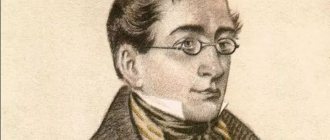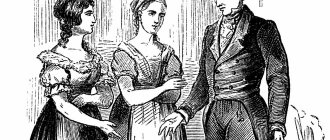- Essays
- Literature
- Griboyedov
/
/
The great work touches on an important topic: the problem of education. The main character is open, sincere, honest and well educated. But is it easy for him to live with this? Chatsky is able to fall in love with the daughter of the owner of the house, but at the same time, he cannot find the strength to get along with her father and the house. His views on the world, as well as his social ideas, do not coincide with the ideas of the Famusov house. Without a doubt, he sincerely loves the daughter of the owner of the house, but is unable to tolerate the hypocrisy and injustice in the society in which he will be and communicate. Because this does not correspond to his ideals: he always prefers to speak only the truth, and is not afraid to speak. Chatsky is an honest servant of his fatherland, but unfortunately, no one realizes this, they do not understand him. And he suffers doubly from this.
Without a doubt, the hero has his flaws. He has a very ambiguous and contradictory character. He is very hot-tempered, conflictual in communication, quite arrogant, and sometimes even a tactless nobleman. The reason is that he is constantly outraged by the society in which he exists. It is difficult for him to restrain himself, he does not miss the opportunity to ridicule the immorality of the society around him. Emu has a hard time controlling his anger. He chose to make it his goal to resist the injustice he witnesses. Chatsky is smart. But the hero suffers in this society; it is difficult for him to live side by side with these people. It is not without reason that the author gave his work “Woe from Wit”.
Alexander is happy to serve (the Fatherland), but he will not serve (anyone). He has no desire to even bow down to anyone. Being an intelligent, well-mannered and decent person, living according to his conscience, turned out to be insufficient. It is difficult for him to cope with the fact that fate is sometimes so unfair and merciless towards honest people. Even his beloved, ultimately, made a choice in favor of a man much inferior in education to the main character. This is also true grief.
The image of Alexander is dramatic. Nobody supported his views. He remained in the minority. He finds nothing else but to leave these places and go far away. Has Chatsky retreated from his beliefs and views? No, he didn’t retreat, he didn’t betray. He just left.
Characteristics of Alexander Chatsky in the play Woe from Wit by Griboyedov
Chatsky stands at the center of Griboedov's comedy "Woe from Wit." He is not a comic hero at all, but is involved in the comedy of the life of Moscow noble society at the beginning of the 19th century.
Fate is not kind to him. Since childhood, there was neither father nor mother next to him. He was raised as a foster child in Famusov's house. Since childhood, only Famusov’s daughter Sophia, his peer, who was also left without a mother, became close to him from his childhood. Common experiences, some classes in a home class under the guidance of a German, a mentor with an index finger, obviously brought the children closer together, love came.
Chatsky is faithful to youthful love and at the beginning of the play admits that he rushed along snowy roads without taking a breath in order to quickly meet Sophia after three years of separation. He dreams of marriage and personal happiness.
The reader and viewer, meanwhile, understand from the very beginning that Chatsky’s hopes are in vain. “The hero of the novel” by Sofia Famusova is Molchalin.
Alexander Andreevich will have to play a different role - to fight in one house on one day, the echoes of which will spread throughout Russia, and not just in Moscow. Chatsky did not prepare for it. But in the remarks of Famusov and Molchalin, one can guess that he is no stranger to fighting.
Obviously, the hero, thanks to his intelligence and determination, made a successful career and had connections with ministers. But he suddenly broke off his relationship in the service, retired and went abroad. His desire to serve “the cause, not individuals,” no doubt did not find support. Probably, even then there was an ideological battle and Chatsky dotted all the i’s for himself.
Now, three years later, the hero does not allow the thought of serving (“I would be glad to serve, it’s sickening to be served”). But he does not want to remain silent, to ignore the same wisdom of veneration and servility imposed on him. He lives by his wits, and everyone benefits from his well-aimed, brilliant characteristics.
The main thing that makes Chatsky a real hero is not so much his brilliant mind as his courage to be different from everyone else and to openly declare this. Realizing that he has no support in an ossified society, he does not remain silent, calls everything by its proper name, and decisively reveals the meanest features of his past and present life. The hero rebels, boldly accuses, argues, and ridicules generally accepted principles. They cannot ignore him, they are afraid of his injections.
Although he is alone in Famusov’s camp, he is a real warrior - not Don Quixote, because his opponents are not mills, but real evil: serfdom and serf-owners, who, in pursuit of foreign fashion, have lost Russian features, their native language, and see only serfs among the people . In the service, they manage things to please first of all their superiors, then themselves and their relatives. Serving duty and the fatherland among the Famusovs, Mollins, and Skalozubs is an unheard of thing.
Chatsky, having stirred up their stagnant swamp, sowed doubts in society, and this is a lot, and his bold accusatory words are also a matter.
Essay 4
You can immediately understand in the monologues that Chatsky expressed thoughts and views that the author himself observed. And the character traits of the main character were copied from Griboyedov himself. The author himself was sharp and enthusiastic. Many of our hero’s views were taken from Alexander Sergeevich himself, and the views were: repeating after foreigners, hard-heartedness towards serfdom and bureaucracy. He himself mentioned them more than once in the area.
The main character himself is a poor nobleman who refused to serve. He explained this by saying that you need to serve the cause, and not someone. His quote is: “I would be glad to serve, but being served is sickening.” Not recognizing authorities, caring for one’s independence, not fearing public opinion, leads to what causes fear among aristocrats. Thus, Famusov offers to live like everyone else, but Chatsky refuses this.
The reason for returning to Moscow is love for Sophia. Arriving in Moscow, he immediately went to Famusov’s house to confess his love for Sophia. So you can understand that he is contemplative, diligent, ardent. For our hero, love is the main thing in life, which cannot exist without it. When he learned that Sophia fell in love with someone else, he was saddened, broken and broken.
The main character does not like the whole past, or rather slavish service in front of all foreigners, sycophancy and servility. Looking at his society, he sees a bunch of people who are greedily hunting for ranks, money, to live well and have a profitable marriage, and their ideal is moderation and accuracy.
Maxim Petrovich for Famusov is a role model, who deliberately falls at the reception of the Empress, bringing pleasure to her and the court, but for the main character this is clowning and lack of self-respect. The aristocrats in this play strive to get their due rank, and are also attached to extravagance and idleness.
Chatsky is infuriated by the desire of old nobles to make useful acquaintances everywhere, thereby attending balls for this purpose. It is better for him not to confuse business with fun and knows that there is a time for all this. In one of the scenes, Alexander Andreevich expresses indignation among the Famusov society, when among the guests there is a person who wants to delve into art and science, the society does not take him seriously and is indignant.
Conclusion
Suffering such a heavy defeat, he immediately leaves Moscow. After everything he has experienced and seen, he stops fighting for hypocrisy. He is alone among this booth, with whom there is no common look and intention similar to him, and therefore he moves away, without looking at anyone, looking for his secluded corner.
Essay about Chatsky
Griboyedov’s work “Woe from Wit” reflects the conflict of political views of a conservative society with people of the new generation and new trends. The comedy reflected this problem brightly, bitingly with the satirical force and wit inherent in this genre.
Chatsky is the only person of the new generation who opposes the conservative majority. It is obvious that the play is devoted from start to finish to the ideas of Decembrism. Here are Chatsky’s patriotic spirit, and loud statements in defense of science and education, and critical remarks regarding serfdom, as well as the idea of the identity of the Russian people, the peculiarities of Russian national culture.
It is interesting that the main character of the work is, in essence, the embodiment of the author, his ideas and passions. Chatsky traveled around the world for a long time, as a result of which he was inspired by the ideas of equality, brotherhood and personal freedom. But upon returning to his homeland, the hero sees that nothing has changed around him, the people have remained the same. Famusov’s house is not happy about Chatsky’s arrival, and the main character immediately notices this. He sees that society in the country is built on hypocrisy and deception, and the main activities of the Moscow nobility are endless celebrations, dances and feasts.
Chatsky belongs to the nobility, is not rich, and at one time refused military service. He explained his action by saying that he did not see any benefit in this matter and that he would be glad to serve, and not to be served.
Chatsky confronts the residents of Famusov’s house: Skalozub, Molchalin, Repetilov and Famusov himself. In the comedy, the author ridicules and condemns these people as representatives of the secular society of that time.
The reason for the return of the main character to his homeland was his boundless love for Sophia. Once in Moscow, he immediately goes to Famusov’s house and confesses his feelings to the girl. Based on this act, Chatsky can be characterized as an ardent, passionate and romantic person. Love for him is the highest feeling, a shrine. What pain he has to experience when he finds out that Sophia loves Molchalin.
Chatsky is educated, has a subtle, sharp mind and resourcefulness. But those around her seemed not to notice all these qualities, and only the maid Lisa was able to note them in a conversation with Sophia. But she didn’t pay any attention to the girl’s words.
The main character sharply condemns serfdom, calling them the source of misfortune. He despises the Moscow “aces”, for whom wealth and career growth are their ideal in life. Chatsky notes the inability of the older generation to defend their positions and express opinions.
In a confrontation with Famus society, the hero suffers a terrible defeat: Sophia prefers him to Molchalin, society does not accept him and ridicules him. Shocked by these circumstances, Chatsky leaves the city. According to I.A. Goncharov, Chatsky was broken by the quantitative superiority of the “old force,” but he himself dealt a crushing blow to it with the quality of the force of the new generation.
Alexander Andreevich Chatsky
Alexander Andreevich Chatsky is a key character in the comedy by A.S. Griboyedov "Woe from Wit". Chatsky is a hereditary nobleman and aristocrat by origin. A native of Moscow, Chatsky was surrounded by representatives of high society from birth. After the death of his parents, he became the sole heir to an enviable estate. Since Chatsky had no other relatives, his father’s friend Pavel Famusov, who was an official and a well-known person in aristocratic circles, became his guardian. As an adult, Chatsky moves away from Famusov. Being an aristocrat, Chatsky was a member of the English Gentlemen's Club, where, instead of discussing social and political issues, they played cards and dined. First, due to his age, and then due to his departure abroad, which lasted three years, Chatsky was a rare guest of this club.
During his stay abroad, he became familiar with the architectural features, cultural heritage of Europe and the intricacies of relationships between people.
Chatsky was educated and savvy in many issues, such as the arrangement of the world, economics, and foreign languages. Also, as a real aristocrat, he could not afford not to understand music and dance. He never stopped there and constantly developed independently, exploring new directions. Chatsky was inquisitive and took an active life position. It was thanks to these qualities that he became a philosopher at such a young age, but decided to devote his life to running the estate. For this, those around him considered him crazy, because enormous prospects opened up before him.
Chatsky’s speech was not devoid of sarcasm and irony, with the help of which he demonstrated his attitude towards representatives of views alien to him. Being a sincere person who did not tolerate lies, he was sure that people needed to tell the truth. Due to his passionate nature, it was difficult for him to control his emotions. He dreams of a better life for his compatriots and is ready to make every possible effort to achieve this.
Chatsky categorically denies the so-called Famus society and tries in every possible way to resist it. Chatsky’s views are very different from the views of Famusov, because for Chatsky, dignity and honor come first, and for an aristocratic society, bribery and admiration for the boss. If aristocrats recognize only military and civil service, then Chatsky understands the value of science and art. He is confident that people should live primarily thinking about morality, and not about personal gain.
Other topics: ← Is Chatsky smart? ↑ GriboyedovMy attitude towards Chatsky →
`
Popular writings
- Essay Theme and image of the Motherland in The Tale of Igor’s Campaign
“The Tale of Igor’s Campaign” is an immortal work from the era of feudal fragmentation of Russia, the pride of Russian literature. During this period, the leading and especially relevant theme was the unity of the Russian land. - Essay Youth is the future of the country
They say that youth is the best period of human life, because then a person is carefree and has nothing to worry about - he does not feed his family, does not raise children... But is this statement true? - Essay on Petrushka in the comedy Woe from Wit (image and characterization)
Petrushka, the hero of the work “Woe from Wit,” can safely be called a third-person character, because his appearances in the work can easily be counted on one’s fingers
Sample 4
The work “Woe from Wit” shows us the struggle between old and new, which was widely unfolding in Russia at that time between people with the views of the Decembrists and the masters. The rich society dominated by Famusov and his other like-minded people is contrasted in the comedy by Chatsky.
We see that Chatsky’s worldview occurred during a period of growth. He grew up in Famusov's house as an inquisitive, sociable and vulnerable boy. The monotony of established life and the spiritual poverty of the Moscow aristocracy caused him melancholy and complete disgust. He was completely immersed in freedom-loving thoughts about how to reorganize the old society, and therefore did not visit the house where he grew up at all. Even Sophia noticed this. After all, Chatsky leaves in his youth, leaving his girlfriend, in order to travel and at the same time enrich his mind.
Sophia, of course, had ardent feelings for him, but could not understand how the young man risked his personal happiness for the common good. Limited worldviews do not allow her to appreciate the image of Chatsky at its true worth. But the young man did not reject Sophia’s feelings at all. He set spiritual demands wider than personal ones. Returning to Moscow, the flame of his love is full of hopes for reciprocity. However, over time the girl changed. A sensible, serious girl, having read romantic works, is looking for the same sincere love as Chatsky. She soberly assesses Skalozub’s empty phrases and limited horizons. Molchalin seems only to be a sweet and impressionable young man. And if Sophia falls in love with him, it means that she will automatically join the Famusov society.
Chatsky directly assesses Molchalin’s character, which offends the girl. But precise statements about the characters in the play and a sharp mind seem to Sophia to be the young man’s disdain for people. And when the girl evaluates Molchalin at the beginning, this gives some hope to Chatsky. But then, having learned that Sophia still chose her rival as a wife, she greatly insults him. Our hero suffers from being humiliated by being placed next to Molchalin. We see how Chatsky mercilessly tears off the masks of duplicity and meanness from representatives of secular society, which is mired in intrigue and entertainment, debauchery and corruption. Our hero is presented as a humanist. He believes that people should strive to be better. And there are heroes like him. Chatsky spoke about those progressive youth who, albeit in small numbers, began to put forward advanced ideas. And, despite the fact that the character is defeated by Famusov and his supporters, his image is perceived from a positive point of view. After all, such people always exist where there is a struggle between the old generation and the new.
Other works: ← Famusov's Moscow in the comedy Woe from Wit ↑ GriboedovThe meaning of the name of the comedy Woe from Wit →





